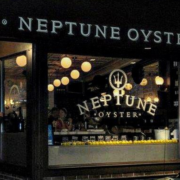Introduction
Extremely Challenging Hospitality Jobs: Shout-out to Boston’s Neptune Oyster Host/Servers
Book Chapter: Human-to-Human Service
Posted: 03/23/2019
Challenge to all readers.
The pic below is just a small snapshot of the frenetic, stressful world of the dual role of host/server, Jes, at Neptune Oyster, one of Boston’s best and busiest restaurants on Friday night.

Jes did an awesome job adding new parties to the long wait list, waiting on tables, calling folks (on the phone) when their table was ready, keeping the peace, and providing excellent service and hospitality with a very positive attitude and presence. Game face executed perfectly.
Neptune is a small restaurant that is perpetually busy with only a tiny waiting area by the door. The host/server role is extremely demanding, requiring confidence, hustle, awareness, speed, efficiency, compassion, and firmness.
The challenge of this post is to identify some of the most difficult hospitality jobs you’ve witnessed, and an opportunity to give a shout-out to the workers who execute them.
Cheers to Jess, Jeff, Matt, Johnny, Ann, Haley, and the entire Neptune team celebrating their 15-year anniversary in November. And order the johnnycake…
Permalink | Posted in Human-to-Human Service, Introduction | No Comments »
Inspiration
Book Chapter: Introduction
Posted: 02/14/2012
It’s an interesting proposition to be confronted with the question, What inspires you? Stephen Torres, founder of the growing website, Imbibe + Inspire, posed this question to me during a recent interview. Here are some of my answers that made it into the interview, and a few relevant inspirations that didn’t:
- Having a mission that I am deeply committed to, Server Not Servant.
- Hardworking, good people.
- The subculture and camaraderie of hardworking people.
- Human dynamics and observing humans.
- Hospitality, and everything it encompasses.
- The trust that workers have in me to share their experiences and feelings.
- Advocating for service industry workers.
- George Plimpton, participatory journalist, a.k.a., “The Paper Lion”.
- Studs Terkel, author of, Working: People Talk About What They Do All Day and How They Feel About What They Do.
- My late Dad, and his unwaivering work ethic (working 3 jobs to support a household of 12 people).
- My late Mom, her compassion, and ability to manage a household of 12 people with one bathroom…
- My loyal siblings, relatives and trusted friends.
- The late Maryanne Hooley.
What inspires you?
Permalink | Posted in Introduction | 4 Comments »
“Without Illegal Aliens, There is No Restaurant Business”
Book Chapter: Human-to-Human Service
Posted: 12/28/2010
That’s a pretty bold statement made by Phanton Gourmet on facebook.
A firestorm was ignited when a recent front page Boston Globe story reported that Upper Crust Pizza, a rapidly-growing local chain, hired and exploited illegal immigrant workers from Brazil.
The promise of a job at an Upper Crust shop, passed by word of mouth from one villager to the next, offered the possibility of wages unheard of in Marilac [Brazil], a community of 4,140 people in the mountains of southeastern Brazil.
Over the past decade, dozens of men from Marilac have made the 7,500-mile trek, risking arrest, deportation, and in rare cases, death. And Upper Crust, founded by Sharon [MA] native Jordan Tobins in 2001, welcomed them.
Tobins needed lots of kitchen help; the Brazilians worked hard and didn’t complain about workweeks that routinely stretched to 80 hours. Marilac prospered as Upper Crust’s immigrant employees sent thousands of dollars home, and the company swiftly expanded from its original store in Beacon Hill to one upscale suburb after another.
Over time, however, this amicable but unlawful relationship would unravel. Documents from a recent class action lawsuit show that as Tobins expanded his pizza empire, he began to exploit his immigrant workers. The employees took their complaints to the US Department of Labor, which ordered the chain to dole out hundreds of thousands of dollars in back pay. The department is now investigating wage violations at Upper Crust for a second time.
As always, comments in response to the Globe report, as well as on a related Boston Yelp Talk thread exploded with hundreds of missives ranging from the typical anonymous hate and vitriol to some very thoughtful and insightful observations.
In the midst of Sunday night’s blizzard, the debate continued on facebook after The Phantom Gourmet posted the following:
Let’s name restaurants that deliver. I’ll start: Upper Crust Pizza.
What really got my attention was a comment made by Phantom Gourmet during the exchange of comments within the thread following the post:
Phantom Gourmet: I’m sorry to tell everyone, but without illegal aliens, there is no restaurant business. Hurting this company, or any other company, is not what our state needs right now.
In case Phantom Gourmet takes the post and related comments down, I have provided the comments in the order that they appeared:
Jimmy Machin: Didn’t Upper Crust just get busted for exploiting their workers?
Debbie Delia Fowle: Why is Phantom Gourmet assisting in advertising Upper Crust when they are under investigation for employment issues? I would think you would want to keep your distance until the end results come out
Bob Ullman: Exploitation of employees? Give me a break! If people are willing to work for X dollars an hour with no benefits then it’s their fault, not the employer. They are in a business, not a charity! I will second the vote for Upper Crust Pizza.
Phantom Gourmet: Bob, good for you, they have hundreds of employees and do a lot for charity and generate millions in tax revenue, I would think we would all be rooting for businesses to expand and hire. Plus, the pizza is really tasty.
Patrick Maguire: Yes, Bob, exploitation of their employees. Stop drinking the Kool Aid and read the full story. I don’t know anyone who supports or patronizes Upper Crust any more, even if they like their over-priced pizza.
Vincent Errichetti: Upper Crust broke no laws. The Boston Globe is just mad they didn’t buy advertising in their bankrupt news paper. BTW how does a bankrupt newspaper afford to send a reporter to South America???????
Lynn Boston: Anybody who hires illegals is part of the problem!!! I’ll never call the Upper Crust. Too many good pizza places out there who don’t break the law.
Phantom Gourmet: I’m sorry to tell everyone, but without illegal aliens, there is no restaurant business. Hurting this company, or any company, is not really what our state needs right now.
Patrick Maguire: “Upper Crust broke no laws.” Then why did they pay a 350K in back pay as ordered by the US Dept. of Labor? They are also defending a complaint from a former operations manager (7-yr. employee), the District Attorney’s Office and several other agencies. Take your head out of the sand.
Matthew Conley: Phantom is waaaaay off on supporting these scumbags. Please do not support these guys in any way. The excuse that “everyone does it” is no justification. Love PG but they are in the wrong keeping company with these clowns.
Patrick Maguire: “I’m sorry to tell everyone, but without illegal aliens, there is no restaurant business.” My hunch is that there are a lot of restaurant operators who would take exception to that statement.
Phantom Gourmet: Patrick, feel free to ask around, and get back to me. Of course, not every restaurant, but every restaurant will KNOW a restaurant.
Patrick Maguire: Phantom Gourmet- I’m working on a blog post about this that will include input from restaurant workers and operators. Please send me a message to let me know who I should be contacting to get official statements from the Phantom Gourmet responding to your comments in this thread. Thank you.
MC Slim JB: It is true that many restaurant hire undocumented workers. The issue with The Upper Crust is not in hiring them, but exploiting them. Caught doing it once, and now accused of continuing that pattern. We know they’re your sponsors, Phantom, but let’s not pretend folks don’t know that story.
Adam Castiglioni: Dear Phantom Gourmet- When will you drop the Upper Crust as a sponsor of yours? I fear that your company may become part of the whole controversy surrounding them soon. There are so many other great pizza places that you could bring on as advertisers that may not exploit their workers.
Obviously there are a lot of loaded issues here. Everyone who is, or has previously been in the restaurant business, knows that ‘illegal’ immigrant workers have been part of the fabric of restaurants for a long, long time. The vast majority are great workers, great people and an integral part of many restaurant families.
Restaurateurs turned a blind eye to the issue, especially in urban areas and border states, for several decades because it’s a win-win for the restaurant and their employees.
However, with immigration a hot button topic today, many restaurateurs are starting to address the issue proactively. Some are taking steps to retain immigrant workers by offering English classes and sponsoring workers in pursuit of their permanent resident alien status (green cards). Additionally, owners and managers are more carefully vetting their employees, when previously they would accept documents that they knew were suspect at best.
These complex issues raise several questions for candid, thoughtful discussion for customers, restaurateurs, workers and even other American business owners:
1. How prevalent is the use of illegal or undocumented workers in the restaurant business in the United States today? How about other businesses?
2. Are there some restaurants or businesses that would fail without illegal or undocumented workers?
3. Are these workers taking jobs away from legal residents who want them? If not, should we remain quiet as long no one is being taken advantage of?
4. How prevalent is the exploitation of immigrant workers? Do you personally know of any workers who are being taken advantage of?
5. How thorough is your restaurant or business when it comes to verifying the legal status of prospective employees before hiring them? How well do companies follow up with required documentation after an employee is hired?
6. What are highly-ethical restaurants doing to address the issue of illegal workers? Are some restaurants screening, coaching, training and counseling employees to ensure compliance with immigration laws and citizenship requirements? Are any restaurants/businesses going above and beyond to retain valuable immigrant workers?
7. How true is the old adage that illegal immigrant workers are critical to the success of American restaurants or businesses because legal workers are not willing to do the same work for minimum wage, or the wages paid to the illegal workers?
8. At what point do you as a consumer, vendor or business partner sever your relationship with a restaurant or business because of ethical issues such as exploitation of workers? Do you have any specific examples?
I will not patronize Upper Crust Pizzeria because of the Department of Labor findings and the on-going investigations.
I invite everyone to join the conversation. Please keep your comments respectful and civil. As always, comments will be monitored before being approved. Thank you.
Permalink | Posted in Human-to-Human Service, Introduction | 36 Comments »
Merry Christmas from Boston
Book Chapter: Human-to-Human Service
Posted: 12/25/2010
Permalink | Posted in Human-to-Human Service, Introduction | 3 Comments »
Blast Magazine Interview
Book Chapter: Introduction
Posted: 11/16/2010
One of the most challenging aspects of writing your first book is creating a credible platform to attract prospective literary agents and publishers. Thanks to the support of readers, we have created a platform that is attracting attention from a variety of media outlets. I am grateful to everyone who has contacted me with their insight and suggestions, and to everyone who has shared this project with their personal and media contacts. Please keep the ideas and referrals coming.
I am sharing this interview to further clarify the mission and message of the blog and book project.
Article and interview by Shannon O’Neill, Blast Magazine:
The other day, a customer of a South End restaurant demanded a gift certificate when he forgot his doggie bag of leftovers. This is the type of behavior that drives Patrick Maguire, author of the popular blog “I’m Your Server Not Your Servant,” insane…
He is currently working on a book — you can read it in progress on his blog — about the bullshit endured by service workers thanks to holier-than-thou customers who believe in the sacred “customer is always right” mentality. Maguire could have easily written a memoir about his various experiences, giving us perspective into a well-seasoned worker’s gripes, but instead he chose to create something to unite all service workers in expressing what they have gone through, with the goal of making us all aware that they are our servers, not our servants.
BLAST: You’ve had lots of service jobs. Which one was the most difficult?
PATRICK MAGUIRE: I loved bartending, but it was definitely one of the most difficult jobs I’ve had. Dealing with douchebags was a common occurrence, especially after they’ve had a few beverages. Customers have almost as much to do with the success of the customer-server human interaction as the server does, but unfortunately, a lot of people are clueless when it comes to common courtesy and mutual respect. I put a list together of 64 Suggestions for Bar Customers. A lot of people need to read it.
BLAST: What service job do you think — perhaps from your own experience or from your research — is the most under-appreciated?
PM: Support positions, such as prep cook, dishwasher, nursing assistant, secretary, paralegal, food runner, busser, and barback, to name a few. They are the unsung heroes, and are subject to some of the harshest behavior that human beings are capable of. A lot of customers treat support personnel in a condescending, elitist fashion because they think that workers are “beneath” them. It’s appalling.
BLAST: Tell us about a horrible experience you’ve had with a customer, one that really sticks out in your mind. How did you handle it? How should horrible situations be handled?
PM: Most of the horrible experiences I’ve had of late are with fellow customers in the supermarket, sandwich shop, at Fenway, restaurants, the doctor’s office, the library, on the T, in fact, everywhere human beings share public space. You pick and choose your battles, but I’ve become more vigilant about pushing back and speaking up. We need to look out for each other and not tolerate abuse when we hear it or see it. I have a chapter in my book called, Confront Without Being Confrontational that will offer suggestions on pushing back and raising awareness.
BLAST: In your introduction, you say, “The 5 percent factor is steadily growing, and…civility and common decency are declining.” Why do you think that is?
PM: The 5 percent factor that I referred to was my perception of the number of impossible customers who are also miserable, awful people with their families, co-workers and everyone they encounter.
I was in a diner a few weeks ago and I watched and listened to a waitress offer a woman a coffee refill. The woman clearly heard her but said nothing. The waitress responded with, “Okay, the silent treatment.” When the customer was out of earshot, I said, “What’s up with her?” The waitress replied, “Some people struggle with kindness. At least I don’t have to go home with them.” Touché. I always wonder what it’s like living and working with those bastards.
There are several reasons for the decline of civility and common decency: poor parenting, lack of role models, poor education, narcissism, entitlement, lack of awareness, and ignorance, to name a few. We also live in an instant gratification society where we expect everything now.
BLAST: Do you think that customers feel they have a sense of power over their servers? Is there a disconnect for customers, where they don’t see the server as a person?
PM: Some customers do have a sense of power over their servers. Many of them are making up for their own lack of self-esteem. They have an “I pay you; I own you” mentality, and love to degrade and torture workers and fellow human beings. It’s a very twisted, sick mindset and existence.
A lot of customers forget or don’t care that they are dealing with fellow human beings. Their lack of empathy and awareness is frightening.
BLAST: What do you hope readers get out of your blog and your future book? Why did you feel compelled to write it?
PM: I was driven to write the book because I was sick and tired of witnessing the abuse of service industry workers from a growing population of arrogant, entitled, demeaning customers. It’s very disturbing to witness what a lot of people think is okay. I had to speak up and do something about it. Everyone wants to point the finger at bad customer service, and no one is advocating for workers and shining the spotlight on bad customers. The book will be a voice for service industry workers who can’t say what they would like to for fear of retribution.
In addition to advocating for servers, the heart and soul of the book will be in the chapter, “Human-to-Human Service.” As I immersed myself in writing the book, I soon realized that beyond the customer-server relationship, my mission is really to promote civility, common courtesy and compassion in all walks of life. That explains the book’s subtitle, “A Case for Human-to-Human Service and Civility,” which is about co-existing, communicating with and responding to fellow human beings. I want to engage readers in a dialogue and raise awareness about mutual respect and common courtesy.
[Thanks to Shannon and everyone at Blast Magazine. Please forward this link. Media inquiries welcome.]
Permalink | Posted in Introduction | 3 Comments »







